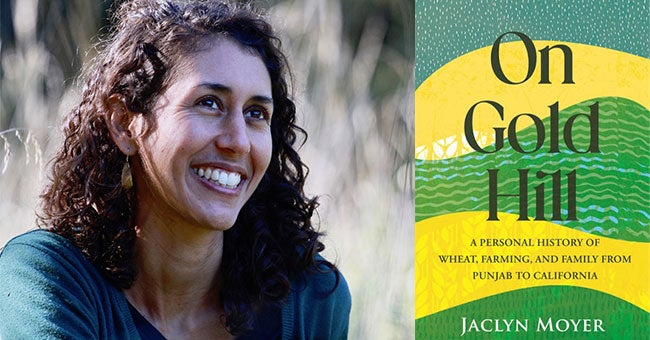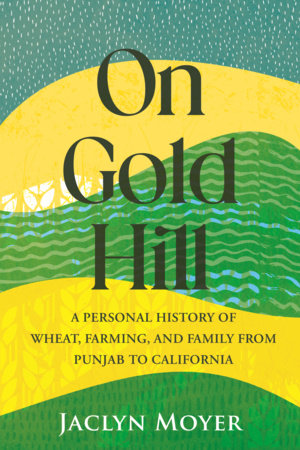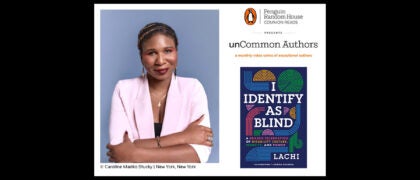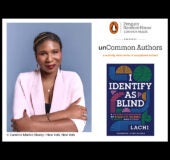A Q&A with Jaclyn Moyer
In 2012, twenty-five-year-old Jackie Moyer—the daughter of a forbidden marriage between a white American father and a Punjabi American mother—leased 10 acres of land in Gold Hill, California, and embarked on a career in organic farming. With a fractured relationship to her heritage, Moyer saw an opportunity for repair when she learned of a nearly lost heirloom wheat variety called Sonora.
In On Gold Hill: A Personal History of Wheat, Farming, and Family from Punjab to California, Moyer maps her personal story of reconnecting with her Punjabi heritage atop the entangled histories of wheat cultivation and the rise of the organic farming movement. With a passion for dismantling the exploitative big-agriculture industry, she examines how the development of high-yielding varieties and chemical fertilizers has harmed our relationship with food, the planet, and each other. Beacon Press senior publicist Bev Rivero caught up with her to chat about it.
Bev Rivero: You write about learning the origins of the organic farming movement through your research into the history of wheat development and your own family’s past. What might people be surprised to learn that you discovered?
Jaclyn Moyer: I wasn’t intending to write about the history of the organic farming movement when I started this project, but as I began to uncover my family’s past, I discovered that the origins of the organic movement, the development of modern wheat, and my own personal history intersected. And all three were bound up with colonialism.
I was reading about the Canal Colonies—a region in present-day Pakistan that was once a breadbasket for the British empire and the place, I’d recently learned, where my grandmother was born—when I came across a passage that mentioned a wheat breeder by the name of Albert Howard. I recognized the name, but it took me a moment before I realized why: Howard was the renowned “father” of organic agriculture. But here, he was not referred to not as a crusading proponent of Nature’s farming, as he would later be known. Instead, he was identified as Imperial Economic Botanist for the British colonial government’s Indian Agricultural Research Institute.
I read on to learn that, in 1905, long before Howard become famous for popularizing organic growing methods, he was invited to India as part of an effort to develop Indian agriculture in order to quell rising local unrest and calls for self-rule. Howard was tasked with improving crop production in the subcontinent, beginning with wheat. At the time, a cheap and efficient process for manufacturing nitrogen did not yet exist. Thus, synthetic fertilizer remained expensive, putting its use out of reach for most Indian farmers. Manure, a traditional natural fertilizer, was also scarce due to its use as a fuel for cooking and heating. Faced with these limitations and charged with increasing crop production to stave off hunger while also generating profits for the British government via crop exports and taxation, Howard set out to find alternative methods for maintaining soil fertility. The techniques he developed and refined—particularly his procedure for making compost fertilizer by building heaps of plant material—would later form the foundation for modern organic agriculture.
This story was quite different from the popular origin story of the organic movement as I’d always heard it. In that more common story, Howard, driven by concerns for ecological and human health and disillusioned with Western agriculture, seeks out traditional peasant farmers of the East who teach him to grow food holistically using their ancient methods just as they’d been doing for millennia. This story, in which the economic and political context is omitted and replaced with romantic notions of timeless traditions and Eastern mystique, obscures the ways colonialism had so thoroughly disrupted the lives of those “traditional” farmers—driving a shift from subsistence farming and local food production to growing cash crops for export; increasing land alienation and dispossession; and perpetuating poverty and indebtedness via heavy taxation. I wanted to explore the fuller story of Howard’s time in India and the economic and political factors that led to his development of organic methods, because this story shed due light on the broader forces—those that lie beyond a farmer’s particular skills, traditions, or proclivities—that shape the way food is produced.
BR: The importance of place in your book is so strong. When writing the book, did you plan to have travel as a theme and to evoke such strong imagery of California and India?
JM: I embarked upon writing this book, in large part, to understand the places I was from—my family’s ancestral village in northern India where my mother was born, and the foothill town in Northern California where I grew up and later returned to as a young adult to start a vegetable farm. Both places were fundamental to my own life story, and I wanted to better understand my relationship to each, and their relationship to each other.
I did not plan for travel to be a prominent theme. In fact, very little about this book was planned. Instead, On Gold Hill unfolded over many years and evolved as I had experiences—one of which was traveling to India—that opened up questions I wanted to explore on the page.
Spending time in my family’s home village in Punjab—standing in the room where my mother was born, walking along the wheat fields surrounding the village, shelling peas in the courtyard of a cousin’s house, watching the moonrise from a rooftop—changed the ways I understood myself, my position in the world, my farm life in California, and my family. To convey the transformative nature of that experience in all its complexity, I strove to evoke the place itself as fully and precisely as I could for my readers.
The writer Ron Rash once said, “Landscape is destiny.” I read this line midway through working on my manuscript and thought about it often. In many ways, the words resonated deeply with me. The truth of this sentiment was illuminated in the stories I was writing: The lives of the characters in my pages were undeniably shaped by the places they lived, all of us subject to opportunities and constraints presented by our environments. But in other ways, I bristled at the notion: In these same stories, I found powerful moments of people transcending the bounds of their environments.
Our personal stories and collective histories are archived in the land. From the gold mining scars that marked the hills surrounding my farm, to the dead zones in our oceans, to the varieties of plants that populate our fields, the details of our landscapes reveal much about our lives. The places central to On Gold Hill—my farm, my family’s village in Punjab, my grandmother’s tract house in the San Fernando Valley, the Northern California town where I grew up—are, to me, as important to the narrative as the characters. I wanted to render these places with the same level of complexity and detail as I gave to the people who move through them.
BR: On the process of getting the farm up and running and selling for the first time, you write: “We didn’t think to subtract anything—not the lease payment, the cost of seed, water, fuel, packaging, electricity, certification, soil amendments. Certainly not our own labor. We just zipped the stack of bills into a bank bag and felt the bulk of it inside.” On Gold Hill is so honest about the finances of small farming. Why was it important to include this aspect in the book?
JM: The economic realities are often omitted from popular narratives of small organic farming. Sometimes, the financial aspects are portrayed as irrelevant (as in the sentiment “good farmers aren’t in it for the money”). Other times, the economic reality—that the majority of small farms in America don’t provide a livelihood and most small farmers rely instead on an off-farm income source to get by—is obscured by the proliferation of depictions suggesting otherwise: thriving farmer’s markets; photos of grinning families displayed on food labels; Instagram feeds full of abundant produce and grinning proprietors.
To me, it felt important to be honest about the financial reality of my farm to shed light on the barriers that prevent people with limited access to capital from establishing or maintaining financially sustainable small farms: lack of access to land; expensive equipment; high housing costs. The financial precarity of small farming in America is nothing new, nor is it inevitable. Instead, it’s tied to a long history of labor exploitation, land appropriation and speculation, and market consolidation, and it is perpetuated by policies that serve agribusiness at the expense of farm workers and small farmers who lack access to land or capital.
Talking about money still feels very taboo in America. Even as it has become easier to openly discuss sexual preferences or racial identity, it remains quite difficult to ask a person how much money she makes. This public and private reluctance to be transparent about income and wealth only works to uphold inequality. To move towards a more just society, we need to talk much more frankly about money.
BR: What are some books or other media that you would recommend to readers of your book?
JM: I read widely across genres and subjects when working on this book, and was inspired by countless works by academics, fiction writers, memoirists, reporters, and poets. Here’s a very incomplete short list of some books that informed my own, as well as others I’ve read more recently that feel in conversation with many of the same themes, in no particular order:
- Where I Was From, Joan Didion
- Factories in the Field, Carey McWilliams
- Having and Being Had, Eula Biss
- The Magical Language of Others, E. J. Koh
- Agrarian Dreams, Julie Guthman
- The Far Field, Madhuri Vijay
- Poverty, By America, Matthew Desmond
- First the Seed, Jack Kloppenberg
- The Violence of the Green Revolution, Vandana Shiva
- On Earth We’re Briefly Gorgeous, Ocean Vuong
- Lies of the Land, Steven Conn
- The Yellow House, Sarah Broom
About Jaclyn Moyer
Jaclyn Moyer grew up in northern California’s Sierra Foothills. Her nonfiction has appeared in The Atlantic, High Country News, Salon, Guernica, Orion, Ninth Letter, and other publications. She has been a Fishtrap Fellow, a Sozopol Literary Seminars Fellow, and a finalist for the PEN/Fusion Emerging Writers Prize. She has worked as a vegetable farmer, bread baker, teacher, and native seed collector. Moyer lives with her partner and two young children in Corvallis, Oregon.
This post was originally published on Beacon Broadside
Read an excerpt from On Gold Hill: A Personal History of Wheat, Farming, and Family, from Punjab to California






